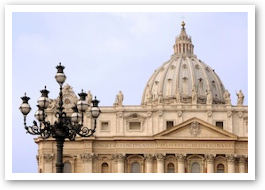The Magisterium's Imprimatur
- FR. WILLIAM SAUNDERS
I have often noticed in Catholic books "imprimatur" and "nihil obstat." What do these terms mean? Do they show that a book teaches what the Church teaches?
 |
Before addressing the terms themselves, we must remember that the Magisterium, the teaching authority of our Church, has the duty to "preserve Godâs people from deviations and defections, and to guarantee them the objective possibility of professing the true faith without error" (Catechism, No. 890). Therefore, under the guidance of the Holy Spirit, whom our Lord called the Spirit of Truth, the Magisterium preserves, understands, teaches and proclaims the truth which leads to salvation.
With this in mind, the Magisterium will examine those works, particularly books, on faith and morals and pronounce whether they are free from doctrinal error. On March 19, 1975, the Sacred Congregation for the Doctrine of the Faith issued the following norms in this matter: "The Pastors of the Church have the duty and the right to be vigilant lest the faith and morals of the faithful be harmed by writings; and consequently, even to demand that the publication of writing concerning the faith and morals should be submitted to the Churchâs approval, and also to condemn books and writings that attack faith or morals." This mandate was reiterated in the 1983 Code of Canon Law, No. 823.
The review process would then begin with the author submitting the manuscript to the censor deputatus, who is appointed by the bishop or other ecclesiastical authority to make such examinations. If the censor deputatus finds no doctrinal error in the work, he grants a nihil obstat attesting to this. Translated as "nothing stands in the way," the nihil obstat indicates that the manuscript can be safely forwarded to the bishop for his review and decision.
Similarly, a member of a religious community would submit his work to his major superior. If the work is found free of doctrinal error, the major superior grants an imprimi potest, translated as "it is able to be printed." With this approval, the manuscript is then forwarded to the bishop for his review and decision.
If the bishop concurs that the work is free from doctrinal error, he grants an imprimatur. From the Latin imprimere, meaning to impress or to stamp an imprint, imprimatur translates, "let it be printed." Technically, this is the bishopâs official declaration that the book is free from doctrinal error and has been approved for publication by a censor.
Keep in mind that the imprimatur is an official permission pertaining to works written by a member of the Church and not by the official teaching Church, such as a Church council, synod, bishop, etc. The author can seek the imprimatur from his own bishop or from the bishop of the diocese where the work will be published.
While a Catholic author can certainly publish a manuscript without seeking the bishopâs imprimatur, some works require this official approval before they can be used by the faithful. Prayer books for public or private use, and catechisms or other catechetical materials (or their translations) require the bishopâs permission for publication (Code of Canon Law, No. 826, 827.1). Books related to Sacred Scripture, theology, canon law, Church history, or religious or moral disciplines cannot be used as textbooks in education at any level unless they are published with the approval of the competent ecclesiastical authority, or receive such approval subsequently (No. 827.2). Finally, books or other writings which deal with faith or morals cannot be exhibited, sold, or distributed in churches or oratories unless they are published with the approval of the competent ecclesiastical authority or receive such approval subsequently (No. 827.4).
In all, these official declarations state that a publication is true to the Churchâs teachings on faith and morals, and free of doctrinal error. Too many souls are in jeopardy because of the erroneous literature that is promoted as genuinely representing the Catholic faith. In an age where publications are abundant, a good Catholic must be on guard and look for the imprimatur before buying.
 This is Fraser Field, Founder of CERC. I hope you appreciated this piece. We curate these articles especially for believers like you.
This is Fraser Field, Founder of CERC. I hope you appreciated this piece. We curate these articles especially for believers like you.
Please show your appreciation by making a $3 donation. CERC is entirely reader supported.

Acknowledgement
Saunders, Rev. William. "The Magisterium's Imprimatur." Arlington Catholic Herald.
This article is reprinted with permission from Arlington Catholic Herald.
The Author

 Father William Saunders is pastor of Our Lady of Hope parish in Potomac Falls, Virginia. He is dean of the Notre Dame Graduate School of Christendom College. The above article is a "Straight Answers" column he wrote for the Arlington Catholic Herald. Father Saunders is the author of Straight Answers, a book based on 100 of his columns, and Straight Answers II.
Father William Saunders is pastor of Our Lady of Hope parish in Potomac Falls, Virginia. He is dean of the Notre Dame Graduate School of Christendom College. The above article is a "Straight Answers" column he wrote for the Arlington Catholic Herald. Father Saunders is the author of Straight Answers, a book based on 100 of his columns, and Straight Answers II.


